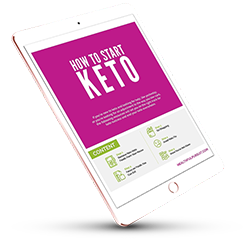I want...
How The Keto Diet Is Different For Women
April 6, 2018 By
Leanne Vogel

 July 18, 2018
July 18, 2018
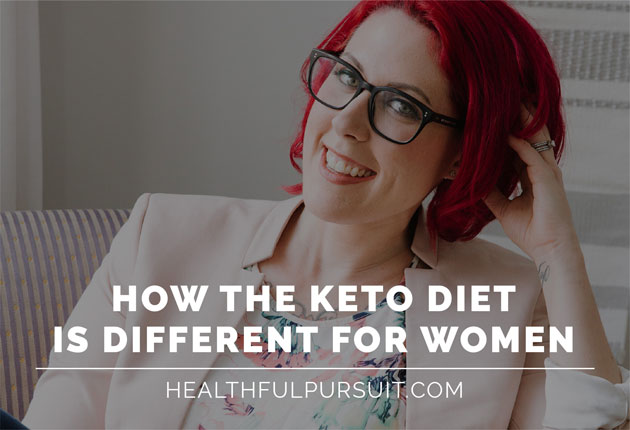
How keto women are affected by a low-carb diet – what happens to hormones on keto, and how to adjust the ketogenic diet to work best for women.
Your diet is one of the most important aspects of your overall health, so before choosing a specific diet to follow, it’s important to know everything you can about it. You may have heard negative things about a ketogenic diet, especially when it comes to women following the diet. Some health experts are saying that a keto diet negatively affects a woman’s hormones. While your diet and nutrition definitely affect your hormones, it’s a myth that the keto diet has negative effects.
Keto shopping lists, recipes, and more! Start keto with this FREE 5-step guide.
I'm ready!Unfortunately, many women rely on word of mouth or what they read on the internet to help them make decisions about their health, rather than seeking out better information about keto and how it affects women’s hormones. Misinformation can keep women from trying keto, which is unfortunate because many women would benefit significantly from a ketogenic diet, especially those who suffer from conditions like PCOS, endometriosis, or uterine fibroids.
Read on to learn more about how a ketogenic diet can impact your hormones and how you feel day to day, and what you can do to make adjustments. In this post we’ll discuss the ketogenic diet’s impact on hormones, how you feel, and what adjustments to make.
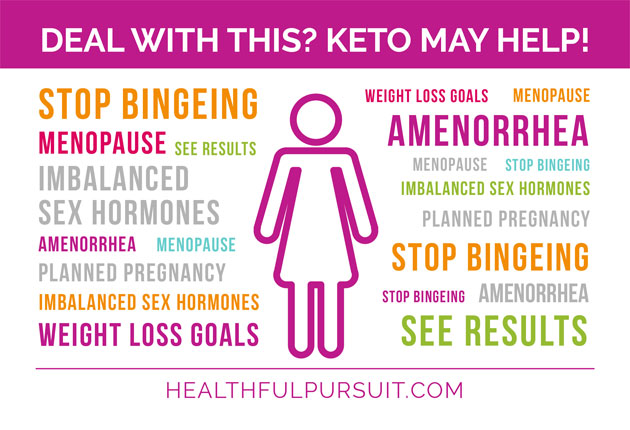
Who Can Benefit from a Ketogenic Diet?
Trying a ketogenic diet could be helpful for women who are:
- In menopause or about to go through menopause
- Having issues with sex hormones
- Struggling with amenorrhea or irregular periods
- Planning on getting pregnant and want to have a healthy pregnancy
- Not achieving weight loss goals with a low fat diet
- Frequently bingeing on high carb foods
- Not seeing results with other diets, like paleo
Keto is a great option for so many individuals, especially women. Of course, it’s important to discuss your individual condition and health with your doctor so that you can get a correct diagnosis and get help tracking any changes in your body.
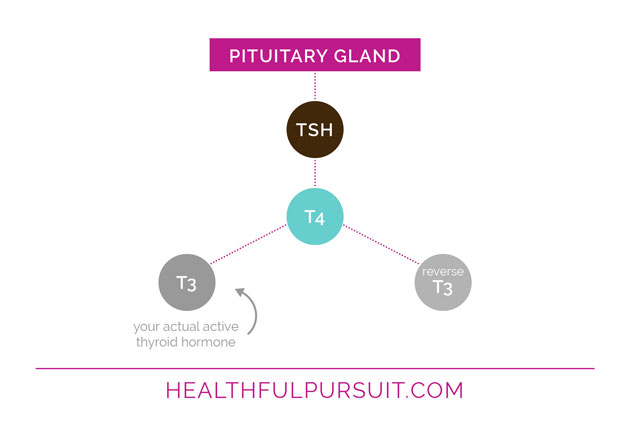
Your Thyroid on a Keto Diet
When your body is in ketosis, is it bad for your thyroid? No, it isn’t – for a few reasons. Let’s take a look. Low carb diets (the keto diet is low carb) and calorie restrictive diets lower the thyroid market hormone known as T3. T3 cells make your other cells use up more energy, and, because of this, scientists believe that a reduction of the T3 hormone could possible increase lifespan – it both conserves energy and reduces free radical production
Both T3 and T4 hormones regulate your metabolism, body temperature, and heart rate. Much of the T3 in your body binds to protein, while the rest of free T3 circulates through your blood. But just because your T3 levels are lower doesn’t mean that your thyroid won’t function properly. Hypothyroidism is often caused by high levels of thyroid stimulating hormone (TSH), and low levels of T4 in your blood. In response, the pituitary gland works hard to try to get your thyroid gland to produce more T4 (which causes high levels of TSH). But the thyroid doesn’t respond to the pituitary gland (which causes low levels of T4). When your T3 is reduced, though, the thyroid is referred to as “euthyroid,” which means a normal thyroid.
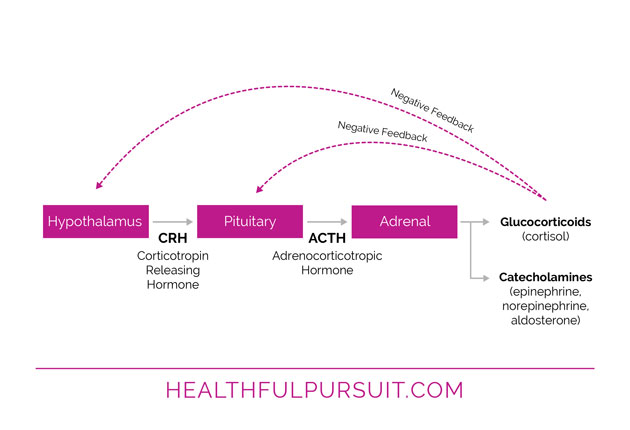
Your Body in Ketosis: the HPA Axis and Stress Hormones
The HPA (hypothalamus, pituitary, adrenal) axis is the big three when it comes to hormonal production. The hypothalamus secretes hormones, which communicate with the pituitary and adrenal glands and tells them to do their jobs producing the hormones they are supposed to. Being in ketosis does not mess this up. In fact, it does just the opposite. A true ketogenic diet can actually increase hypothalamic stimulation, which benefits the HPA axis. There just isn’t any evidence that a keto diet negatively affects the HPA pathway. Ketone signaling uses a different pathway that might be even more efficient. In fact, hypothalamic neuropeptides are very elevated in a ketogenic diet. Hypothalamic neuropeptides are great at hypothalamic stimulation. Ketones can cross the blood-brain barrier, and signal these neuropeptides.
Keto and Cortisol
Cortisol is known as the stress hormone. When your body is under stress, cortisol will tap into your protein stores and produces glucose. Your body would naturally use this glucose to either run from the stress or fight it. In most cases, this would be a good thing. But if your cortisol levels are constantly high, and you’re always stressed out, your brain and body get tired. The extra glucose produced by your protein stores will elevate your blood sugar, and that’s no good for your body. Remember how the ketogenic diet potentially improves the HPA axis? It means cortisol, which is produced within the adrenal gland, is fine. When you’re in ketosis, cortisol levels stay low.
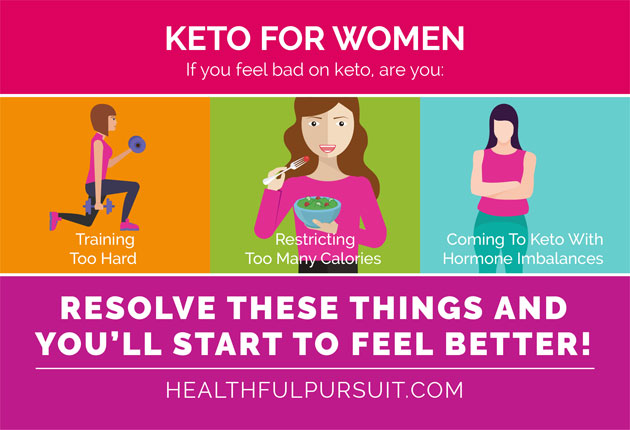
However, if you’re on a keto diet, and you feel bad, here are a few things to keep in mind:
- You’re training too hard – high intensity interval training (HIIT) and a ketogenic diet may not always mix. If you’re doing high intensity workouts three or more days a week, it can definitely mess up your hormones. If this is the case with you, consider what your goals are. If you want to gain muscle mass or improve your athletic performance, high intensity training is what you need to do. If you’d like to decrease inflammation in your body, lose weight, live longer, and prevent disease, then a ketogenic diet is the way you want to go. It can be damaging to try to maintain both of these, so it’s important to really consider which is right for you. In the beginning of starting a keto diet, it can take a while for the body to adjust. During this period, take it easy on the exercise, and slowly ramp up as you feel more comfortable doing so.
- You’re restricting calories too much – if your body simply isn’t getting enough calories, it can mess up your hormones. Restricting your calories for long periods of time isn’t healthy. The problem with a keto diet is that often times, people simply don’t feel as hungry as they used to, and they aren’t getting cravings, so they just end up eating fewer calories in general. Truthfully, it can be tough to make sure you’re eating enough on a keto diet, so it’s important to track how many calories you’re consuming. You might be surprised to see that you’re undereating. Calculate how many calories you should be consuming every day, and as much as you may be tempted, don’t eat less than that. Eating less than you should can put your body into “starvation mode” and it will ultimately mess with your hormones.
- You had hormone problems to begin with – if you’ve always had irregular periods, unexplained chronic headaches or back aches, you may have had a hormonal imbalance to begin with. This needs to be diagnosed and treated by a health professional before you can begin a keto diet.
What a Ketogenic Diet Can Do To Your Periods
If you’ve had an irregular flow for most of your life, a keto diet might normalize this. If you’ve been on birth control and lost your period, or if you have natural amenorrhea (serious athletes and breastfeeding moms could get this), your period could come back, heavy to start.
At first you may have a heavier flow, lasting for longer than normal. Once your body adjusts to the changes in estrogen and fat storage, you can expect your period to return to normal, or even end up being better. While wany PMS symptoms (back ache, acne, cramps, etc) often improve, Ketosis doesn’t cure bloating. This is because of the surge of estrogen that happens during that part of your cycle.
It’s also true that hormones affect your insulin sensitivity. If your blood glucose surges or drops, it is normal. After your period, it should get back to regular levels.
If you’re hungry during your period, you need to eat! When you’re finished ovulating, your body gets ready to pump out estrogen and progesterone. These hormones can cause hunger. Try keto friendly chocolate or cake recipes, or indulge in bacon or steak.
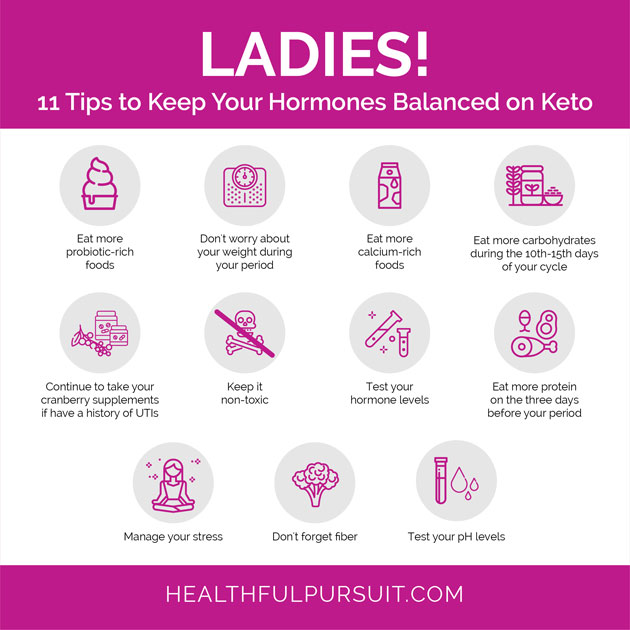
Here’s What to do to Keep Your Hormones Balanced on a Keto Diet
Try these 11 lady-specific tips:
- Eat more probiotic-rich foods. This will help keep your gut bacteria in check.
- Eat more protein on the three days before your period.
- Don’t worry about your weight during your period. The extra weight is retained water.
- Eat more calcium-rich foods. Calcium intake can help with any PMS symptoms you’re experiencing. Think poppy, sesame, celery, and chia seeds, canned sardines or salmon with bones included, almonds, and green veggies like spinach, kale, broccoli, bok choy, and okra.
- Eat more carbohydrates during the 10th-15th days of your cycle, as they are your most fertile.
- Continue to take your cranberry supplements if you tend to get UTIs. Yes, they have carbs, but take them knowing that as your body heals on a keto diet, you may stop getting UTIs altogether.
- Keep it non-toxic. Some beauty products or cleaning products have toxic chemicals. These increase xenoestrogens, which can really imbalance your hormones. Swap out these products for healthier ones.
- Test your hormone levels. The ones you want to check are your SBHG, estrogen, progesterone, and cortisol blood markers.
- Manage your stress. As tough as it is, stress messes with your hormones, and needs to be addressed. try to get seven to nine hours of sleep at night, get moving with moderate exercise, try yoga, meditation, nature walks, and spending time with people who make you happy.
- Don’t forget fiber. If you feel constipated, get fiber from nuts, seeds, and veggies. On top of that drink plenty of water to hydrate your intestines.
- Test your pH levels. Maintaining alkalinity is key – it improves your bone density, lowers inflammation, helps with vitamin absorption, and helps you maintain a healthy weight. If your pH is too acidic, try these keto friendly solutions – lemon juice or apple cider vinegar (mixed in water), mushrooms, spinach, tomatoes, avocado, cabbage, cucumber, kale, jicama, broccoli, oregano, garlic, ginger, celery or green beans
For more on how to balance your hormones on a ketogenic diet, join Happy Keto Body – the only doctor-approved 12-week membership program for women on keto.
Keep your Diet Alkaline on Keto
An alkaline diet can have some amazing effects on your body – including anti-aging, balancing hormones, lowering inflammation, and detoxifying. Many ketogenic diets tend to miss out on this. Before you go keto, it’s best to restore an alkaline pH first, so you don’t feel uncomfortable or overly hungry.
An alkaline diet supports your overall health by reducing symptoms associated with PMS, menopause, and infertility by helping to increase nutrient absorption. Eating foods that are high in certain minerals but not very acidic can also help. The body is naturally alkaline, but modern processed food diets tend to make us more acidic, which causes a whole host of issues, like bone loss, muscle loss, and a lowered immune system. You can test your pH with a urine testing kit. The goal is to ideally have a urine pH level between of 7.0–7.5.
When you combine an alkaline diet with a low-carb diet, many women experience a reduction in their symptoms because of the high nutrient intake, and a lowered amount of toxic substances. Your diet, however, isn’t the only way to affect your pH level and hormones. Stress, sleep and sunlight are other variables.-Fasting is also a great way to maintain anti-aging as well, and can be very healthy. Fasting is particularly great for post-menopausal women for this reason. It allows the body to take a break from digestive functions, and focus on repairing the rest of the body. The body’s resources go towards restoring your cells instead of digesting. Women should eat a light dinner, and then fast for about 13-15 hours between dinner and breakfast. You may see improvements in blood sugar control and weight. Another option is to skip dinner one or two days a week. Tea or broth can help curb hunger. For most women, this is not a big deal, unless the woman is very active. Try cycling your fasting so you fast on two or three non-consecutive days a week. On these days, exercise only lightly or do yoga, so you don’t feel tired or extra hungry.
Think of this as a way to feel better and heal your body as opposed to a quick fix for weight loss. Try it for a few months to test the effects, and try trial and error to figure out what’s best for your body. First, try focusing on alkaline, and then slowly add in fasting and keto.
Precautions to Take Before Starting Keto
Aside from the side effects that your body starts out experiencing while it adjusts (constipation, cravings), you may also have bad breath, menstruation issues, adrenal or thyroid issues, or low energy levels. While you may feel bad at first, remember that your body needs time to adjust. These things should clear up in just a few weeks. Remember to sleep well, reduce your stress, drink plenty of water, and stay moderately active.
Final Thoughts
A keto diet doesn’t affect hormones on its own. Hormonal issues tend to have other causes like:
- Pre-existing hormonal imbalance
- Hypo or hyperthyroidism
- Overtraining
- Not eating enough
- Stress
Rule out these other causes before giving up on keto.
Another step you can take before you decide keto isn’t right for you…
Join a keto community and training course for women.
It’s the perfect way to get a ton of confidence that you’re following keto the way that works best for you.
So many women feel uncertain about keto or overwhelmed by all the information they find on the web. That’s why I created…
The only keto membership program designed by women for women, and with contributions from a Naturopathic Doctor.
Happy Keto Body will equip you to reach your “True Weight”, heal your mind, body and spirit and feel awesome on the ketogenic diet.
Starting a ketogenic diet doesn’t have to be overwhelming or hard. The transition can be simple and before you know it, you’ll be astonished by the benefits beyond weight loss. Things like a clear mind, extra energy, balanced emotions and balanced hormones.
Find out how women all around the world are adapting the ketogenic diet to work for their lifestyle and discover how you can use keto to heal your body.
Take control, end the battles with food, and find your happy place with…
This entry was tagged: carb up, dairy-free keto, eating high-fat, eating keto, eating low-carb, fat-adapted, health, high fat, holistic nutrition, how eat keto, keto, keto basics, keto diet, keto for women, ketogenic, ketogenic diet, ketogenic for women, ketosis, low-carb, low-carb paleo, what is keto
Hi! I'm Leanne (RHN FBCS)
a Functional Medicine Practitioner, host of the Healthful Pursuit Podcast, and best-selling author of The Keto Diet & Keto for Women. I want to live in a world where every woman has access to knowledge to better her health.
